Fall/Winter 2023: Reflections on JFK — 60 Years Later
Volume 33, No. 2
Contents
Introduction
By Diane Scharper
“Mr. President, you can’t say Dallas doesn’t love you.”
The First Lady of Texas turned around and spoke the words to President John F. Kennedy. He was sitting behind her in the open-top 1961 Lincoln Continental convertible, and he agreed: “No, you certainly can’t.”
These were among his last words.
Then as the car entered Dealey Plaza and passed the Texas Book Depository, shots were fired. Kennedy, hit by a bullet, was flung back then to the left, slumping into Jackie’s arms. He was rushed to Parkland Memorial Hospital where he died shortly thereafter.
The irony of Nellie Connally’s final words and JFK’s reply lingers to this day some 60 years later.
It’s ironic too that we “Baby Boomers” who considered JFK our president and who loved him and his beautiful wife and children, are now much older than he was when he died and left us bereft.
We have only images to remember him by. These final scenes seem especially poignant: Kennedy with his arm resting on the side of a dark blue convertible sedan; Kennedy waving at the crowd who were watching the presidential motorcade as it traveled the streets of Dallas; the grassy knoll; the stretcher carrying JFK into Parkland Hospital; Jackie, her pink suit stained with blood, standing beside Lyndon Johnson as he takes the oath of office. John-John saluting his deceased father.
When he died, JFK took our youth with him as well as the innocence of our country. We’ve never been able to retrieve it. No president after him has been loved as much by so many people. Nor have we as a people loved each other as much as we did then.
We’ve tried but never actually understood what happened on November 22, 1963. Was there one assassin? Or were there several? Did the shots come from one area? Or two? The Zapruder film had sections that were damaged or missing. Why?
The assassination of John F. Kennedy is considered one of the most significant events in US history. In the last 60 years, approximately 2,000 books have been written about the tragedy. Over the years we’ve had numerous investigations, theories, and conspiracy theories. Last December, the National Archives released troves of information, yet there were thousands of pages still withheld and which will supposedly be released in June 2023 (but which have not been released as of this writing).
In July 2012 only about 28% of the population were of an age to remember JFK’s assassination. Ten years later (partly because of the number of years and partly because of the pandemic), only 16.8% of us are old enough to remember living through that Friday.
I asked the Memoir Seminar about their memories of the Kennedy assassination. They remembered the event as if it were yesterday. Several read descriptions of their day and choked up at particularly poignant moments, especially Walter Cronkite announcing Kennedy’s death.
A person from India remembered people wearing white—the color of mourning—and packing into the memorial service at the Anglican Cathedral. One member who lived in British Guiana recalled hearing the song My Daddy Is the President and then leaving school early on November 22, 1963, when he heard of JFK’s death.
Everyone seemed to see the tragedy not so much as a political event but as a pivotal moment in their own lives. Many grew up during the tranquil 1950s. It seemed unbelievable that this handsome, young, idealistic president could be assassinated. It still does. But then it happened, and we were devastated.
Most can recount everything they were doing that day; the person who told them about the tragic death; what their immediate reaction was; where they were when they learned about the assassination; what time it was; what they did the rest of that day and that following weekend. Most watched the unfolding story on television.
They can still envision President Kennedy’s flag-draped casket, the caisson drawn by six horses, and Blackjack, the riderless black horse. They can still hear the gunshots which people had at first believed to be fireworks. They see crowds lining Pennsylvania Avenue weeping and the ever-silent eternal flame at Arlington National Cemetery where President Kennedy was buried.
Ultimately, these pages of memories from Osher members attempt once again to understand what happened to them and the country on that long-ago Friday, and to find words for this unspeakable tragedy which deeply affected them, whether they were young children, adolescents, or young adults.
In a sense, these memories are part of JFK’s eternal flame. They attempt to share one of the country’s darkest moments and to bring light from that darkness.
Finally, I wish to thank Susan Howard, Kathy Cooke, Emily Owens, Seairra Pierce, Linda Middlestadt, and Randy Barker whose efforts made this special Osher Journal Edition possible.
Thank you also to our talented and wonderful contributors. Without you, we would not have had a special edition. I’ve enjoyed working with everyone—members of the memoir seminar and members that I’ve never met.
I’d love to continue this tradition of special editions of the Osher Journal.
Diane Scharper is the guest editor of this special edition of the Johns Hopkins University Osher Journal. She is the author of seven books and has written more than a thousand book reviews and op-ed articles for national publications.
Back to the Table of Contents
“Johnny We Hardly Knew Ye”
By Les Weinstein
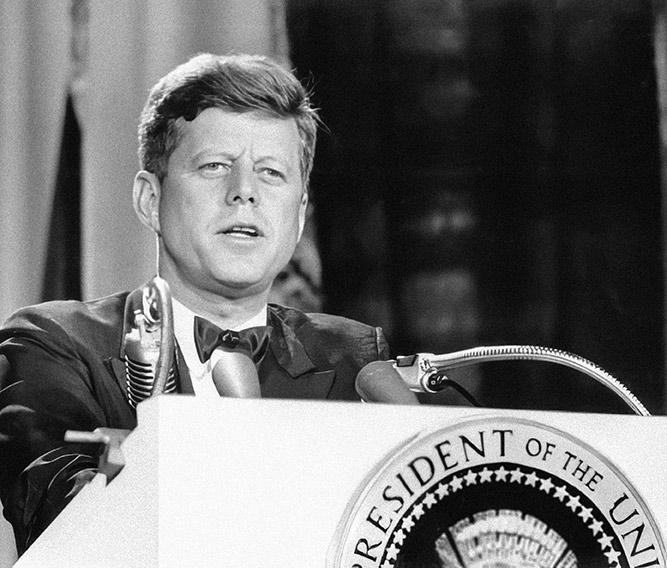 Assassination
Assassination
On the morning of November 22, 1963, I met my friend Tom, who was from Houston, for coffee in Providence. He was a graduate student at Brown University a few blocks away from the office where I was working. I had that day’s New York Times with me which I browsed as I was waiting for him to arrive. There was an article about President Kennedy’s visit to Houston the day before, November 21. When Tom joined me, for some strange reason I told him there was a story in the paper that his brother had attempted to assassinate Kennedy in Houston yesterday. I adlibbed my made-up story to him out loud, pretending to read from the Times, but making it up and using his brother’s name as I did so. He and I had a similar sense of humor, so we both laughed at this improbable fictitious story. Then we talked about other things until I had to get back to work and he had to go to class.
When I got to my office I turned the radio on to listen to music while I worked, which I did every day. At 11:34 EST the station I was listening to was interrupted for a news bulletin that said three shots had been fired at President Kennedy’s motorcade in Dallas. About an hour later, there was an announcement that Kennedy was dead. Soon after, there was a loud knocking at my office door. I opened it to see Tom standing there saying over and over: “How did you know, how did you know, how did you know?” Obviously, I did not know that Kennedy was actually going to be assassinated. But my earlier inappropriate and foolish prank about Tom’s brother was an unbelievable coincidence!
Ruby Shoots Oswald
Two days later, I was watching TV, almost glued to it! There had been nonstop coverage of the assassination and related news. On this day, Lee Harvey Oswald, charged with the murder of Kennedy, was to be taken from the Dallas Police station to another facility. As he was being escorted out, Jack Ruby suddenly came up to him and shot him. Oswald later died of his wounds. Security had been lax, and there were a lot of people in that room. In the chaos and pandemonium after the shot, I thought I saw someone in the crowd who looked very familiar! I stood up very quickly and said: “I know that guy!” I did not know his name, but I thought he was someone who had been a student at Brown when I was an undergraduate there. I thought, if I am correct, there would soon be an article about him in the Brown Alumni Magazine. However, I had to wait until 1968, around the fifth anniversary of the assassination, for such an article to appear for me to learn that he had indeed been at Brown when I was there. He was in the room where it happened because he was a reporter covering Kennedy’s trip to Dallas for the Saturday Evening Post magazine.
Please Vote for “Me”
I was a big fan of Jack Kennedy’s during the 1960 presidential election campaign and I would watch him on TV: debates, interviews, news, etc. I also thought that I could do a fairly good imitation of his voice, probably because both he and I had New England accents, though his was much more pronounced than mine. One evening, as the days were getting closer to the election, I was at a friend’s house and we came up with the idea of picking and calling numbers at random from a phone book, and saying that I was Senator Kennedy and asking them to please vote for “me.” We had a lot of fun doing this. Some people hung up on me, others thanked me for calling, and one woman even said “God bless you!” I felt guilty about that one. Well, just a little bit!
The Crowd
On November 7, the day before the election, Kennedy stopped in Providence to speak in front of City Hall. After this event he would go to Boston to make his last campaign speech before going to the Kennedy Compound in Hyannis Port to await the results of the election. I went to this rally with my friend Rona and 10-year-old brother Kenny. The crowd was very thick and kept moving in the direction of the stage. We had no control over where we wanted to go. It was like a riptide; we had to literally go with the flow, wherever the wave was going. Though I was holding my brother’s hand, at one point I realized I could not see the rest of him, as he was towered over by much taller people pushing against him. Then I heard him yell that he was going to faint. I immediately yanked him up over my head so he could breathe and, of course, see Kennedy better! A very memorable afternoon!
The Cape Cod Motorcade
One summer when Kennedy was president, some friends and I drove to Cape Cod for the weekend. On our way to Wellfleet, when we were near Hyannis Port, we saw what we thought was his motorcade and someone said “Let’s follow it; maybe we will be able to see him!” So we very easily got in line behind the last car of the motorcade. Then immediately we heard a police siren and realized it was for us! We pulled off the road, and a cop came to the car and asked if we knew that following a presidential motorcade was illegal. We all said “No sir”, and he said “OK. I’ll let you go this time but if you do it again, I’ll have to take you in!” As far as I know, none of us ever again followed Kennedy’s, or any other president’s, motorcade!
Epilogue
Jack, we barely knew you, and then sadly and suddenly, you were gone. I am paraphrasing the title of a book by Kenneth O’Donnell and David Powers containing memories of their very close friend, John Fitzgerald Kennedy: Johnny, We Hardly Knew Ye. Fittingly, it’s also the same title of an old Irish folk song which is sung to the tune of When Johnny Comes Marching Home.
Back to the Table of Contents
A Med Student’s Journal Entries
By Randy Barker
As the 60th anniversary of President John Fitzgerald Kennedy’s assassination approaches, our memoir group has been recounting their personal experiences on that day, I think mainly from memory.
I had recalled learning the news in pathology class at the Johns Hopkins Hospital medical school but nothing else came up, so I did not even try to imagine the who and what of my personal experience. It would have been entirely fictional non-fiction.
Then, I discovered several handwritten pages in a journal I was keeping at med school, and there were my words on JFK. I am impressed by the intellectualizing I did with the news, casting around for what it meant re: the state of us “civilized” Americans. For better or worse, I toss this primary material into our group’s hopper of rich JFK November 22 remembrances.
Dr. Walter Sheldon, our pathology professor, told us to stop looking into our microscopes, then announced that the president had been assassinated. He allowed us to quietly leave the lab.
Here are my journal entries, as I wrote them during the day, including a humorous non-sequitur about my mother, and where I put line breaks:
November 22 1963 Death of President Kennedy A man who would have someday had time to himself…he must have been perfectly relaxed this morning for he has had 3 years to overcome whatever 2nd thoughts come to mind on every political occasion. Never a 2nd term…he really lived that campaigning and everything. The Peace Corps Coffee with Willie Woodward after we went to the service for Pres. Kennedy…Hurd Hall…good chance to see a bit of Willie….
I thought how frail everything is in the well-ordered civilization, where we depend so much on each other to think wisely and yet where so many people never think….James F. Cooper understood this problem. Long TV depiction of many details in JFK’s last day, especially the speech given this morning in Fort Worth serious talk on defense but so much light stuff too that it was utterly clear he knows how to be the best of humans.
How this day will make many stop, say I’m alive & you’re alive & start listening to each other again…. We would certainly appreciate each other if we were in real danger somewhere. Epizootic means “around the animals”…funny how Mummy often announces “I’ve got the epizootic influenza I’m sure.”
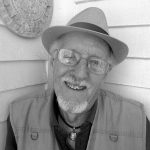
Is the trouble in our democracy that it breeds a lack of respect one man for another more than might occur in older nations, democratic but clearly more mature? Now the privilege of having JFK for president is clearer than it was when he was alive …how much he restored or added confidence to all sorts of aspects of our life that might otherwise be gathering a reputation for being routine & even dull…I mean first the idea of a family that really enjoys one another then the idea of the excitement and fervor of sports, then the idea of helping people in a humble way…the Peace Corps…
Journal entries on JFK stop here.
Back to the Table of Contents
My Daddy Is President
By Sam Dowding
By late 1963, Plantation Versailles was one of the rural sugar estates where the British Army had commandeered quarters. This was the year of British Guiana’s 80-day General Strike called by the Trades Union Council. Sugar was at that time top dog in the economy, thus with the estates on strike, most economic activity across the country had come to a “grinding” halt, pun intended.
From my elders, who all were sugar workers, I first heard the word “rations” which I came to associate with the shortage of food items. Kerosene, the fuel of many rural folks’ kitchens, was in short supply. My mother accordingly returned to cooking over coal-pots and wood-fired hastily fabricated “half-drum cookers” that could accommodate two pots simultaneously. Although the soldiers’ presence in the colony was by then at least a decade long, beginning with the Governor’s 1953 suspension of the first adult suffrage constitution, only recently had they been deployed to Versailles and other rural locations for the stated purpose of stemming the tide of burning canes, the work of arsonists, during the strike.
For their barracks, the soldiers had taken over and converted the junior staff and workers’ clubs, while the officers occupied the slightly more salubrious ground floor of the senior staff club. They could be seen regularly patrolling the roads and back dams in their open-back Land Rovers, American Jeeps, and large Bedford trucks, brandishing Enfield rifles, Bren and Sten guns—armed and obviously dangerous. We kids gave them wide berths at all times. They represented authority, and we feared and respected authority.
On 22 November that year, we learnt a new word: “assassinate.” It was just one year since my rheumatic fever diagnosis and hospitalization and my mother still retained concern that my heart could give out at any time from even mild exertion. Accordingly, to play with my fellows and friends, as 10-year-olds are wont to do, I used to hide in a part of the schoolyard where I felt that she could not glimpse me from our back stairs landing, from which perch she would sit and shell pigeon peas, or “pick” rice for that day’s meal.
That afternoon, I was enjoying a game of “bat and ball”—our small-days version of cricket—when our play was interrupted by one of our younger teachers, Miss Swan, as I recall, with a sharp “Clap! Clap! Clap!” and her urgent command “You boys, stop playing and come back inside.”
Mr. Ivan Bowen, the headmaster of the Malgré Tout Government Primary School, addressed the 200-plus assembly that had all gathered on the top floor of our two-storied wooden school building. And so we learnt that new word. “President Kennedy has been assassinated!” was the announcement that Mr. Bowen conveyed to the hushed gathering. He had been shot. With a gun. In my imagination, it was probably a gun similar to those that the local police and the British regiments brandished on their patrols in our neighborhood.
As a 10-year-old, born and raised on a rural sugar plantation in colonial British Guiana, the only thing I knew about President Kennedy was that he had two young children. The song My Daddy is President, sung by Little Jo Ann, had been a regular item on the airwaves of our two radio stations ever since his storied election three years prior. Silly me, I thought then that Kennedy’s daughter was singing the song!
In the week following his death, our local newspapers, The Guiana Graphic, The Daily Chronicle, Sunday Argosy, and The Evening Post, all carried the news updates and pictures which young me read and poured over with fascination. The news and photo of Jack Ruby shooting Lee Harvey Oswald at point-blank range with a handgun shocked and yet puzzled me as to why the case was not now closed since the guilty assassin had himself been killed. Is vigilante-justice justice?
Looking back 60 years later, I can still taste the fear that guns, and those who wielded them, engendered in my cloistered life. It’s interesting that boys were still given silver six-shooter toy guns at Christmas, and we happily engaged in our hide and seek games, called “gun-shooting” but never “cowboys and Indians.” War movies and Westerns predominated in that era but attending a “film” show at the cinema was now a rare treat, since we had to pay, given that we no longer had access to free movies and documentaries.
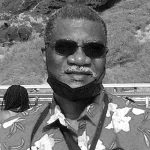
We boys were warned by our parents not to play our gun-shooting games where the soldiers could see us, for fear that they might mistake our toys for the real thing. Teenage and older girls were warned not to associate with the soldiers for fear of the babies that may result, reminiscent of not-so-distant slavery days.
Ultimately, we weren’t warned about 1963. But it was the year that the danger of guns became scarred upon my psyche.
Back to the Table of Contents
Travesty
By Jim Herrell
At 1:30 that Friday afternoon, four of us, first-year psychology graduate students at the University of Maryland, were discussing love. Telling us about a young woman he’d recently met who might be “the one,” Chuck took from his wallet a folded paper he always carried listing Erich Fromm’s essential ingredients of love. “I’m solid with care, responsibility, and respect,” he said, “but a little wobbly with the knowledge thing.” Baker, Dean, and I rolled our eyes.
We’d met Chuck in September and this was already the third or fourth time he’d subjected a girl to his checklist. On a normal Friday, we would have made fun of him, but another student came in and we learned it was not a normal Friday. Numb and disbelieving, we followed our classmate to a room where a few students and professors, some of them crying, were focused on a TV.
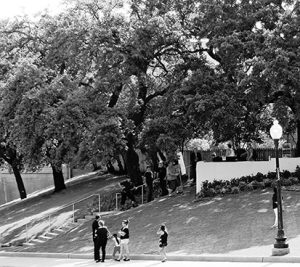
Minutes earlier, CBS had interrupted the nation’s favorite soap opera, As the World Turns, and Walter Cronkite informed America that the President had been shot, after which, lacking additional information, CBS resumed the show. For an hour, rumors dominated the news. Kennedy was dead or he wasn’t. LBJ was wounded—no, wait, it was John Connelly. Cuban communists or Dallas right-wingers? Hoping to stay abreast of developments by switching among channels, we missed Cronkite’s 2:38 p.m. announcement of Kennedy’s death, but we soon heard the news on ABC.
Dean ran home. Baker and I hugged, began crying, were quickly ashamed of ourselves, and attempted, unsuccessfully, to cowboy up. Tearless Chuck repeated a joke I’d told a few days ago, about Kennedy’s believing he didn’t need bodyguards in Texas because no Texan wanted LBJ to become president. I told Chuck to go to hell. He said, “Why are you guys so upset? It’s just one man. The world goes on.” Baker suggested what Chuck might do to himself. “We shouldn’t get mad at Chuck,” I admonished Baker; “Erich Fromm didn’t tell him how to feel when the president is shot.”
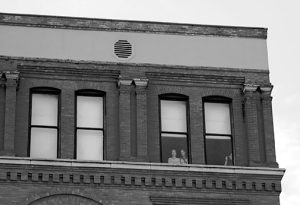
It was a weekend of Beethoven. That Friday afternoon the Boston Symphony Orchestra substituted the funeral march from the Eroica for its scheduled concluding work, Rimsky-Korsakoff’s Le Coq d’Or. WGMS in D.C., and radio stations around the country, played Beethoven all weekend. Dean, who had spent hours in his tiny apartment pacing, smoking, drinking, told us that not until he heard the Pathetique sonata on the radio was he able to grieve.
Sunday afternoon, Baker and I went to the Capitol in hopes of viewing Kennedy’s casket. When we arrived at dusk, the line was already long, and by 2:00 a.m. Monday would extend three miles down East Capitol Street. Before dawn, word spread that the Capitol gates were closed. With no chance of getting in, and no nearby nourishment or toilet facilities, Baker and I, inadequately clad for the cold and occasional drizzle, headed to Pennsylvania Avenue in search of relief.
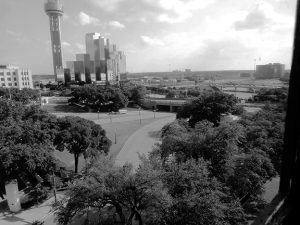
After coffee and pastries at an all-night drugstore, we entered a hotel, used the men’s room, and fell asleep in lobby chairs, from which we were soon evicted. Outside, we elbowed through a swelling crowd until we found a spot near the Old Post Office Pavilion, where we waited, shivering. At 11:00 a.m., the caisson bearing the president’s casket left the Capitol, heading northwest down Pennsylvania Avenue for the White House, and from there to St. Matthew’s Cathedral. The procession, including the Kennedy family and over 100 world leaders, followed, many of them on foot. We were especially awed by Charles De Gaulle, who on that Friday had turned 73, towering above the others as if on stilts.
At 12:15 p.m., as dignitaries began entering St. Matthew’s for a private ceremony, we surrendered to cold and fatigue. Baker linked up with a D.C. friend. Waiting for a bus to College Park, I sat on a bench next to an elderly man who was reading the Bible. “These are hard times,” he said, “and this is all we have now.” He began reading a passage to me, but I waved him off, saying, “It’s doubly hard for those of us who don’t have even that.”
“Then God bless you,” he said, taking my hand in both of his. Suddenly, I wanted to throw myself into his arms, but the bus arrived, so I drew what strength I could from his grasp and boarded.
Sunday, before going into D.C., Baker and I dropped by Dean’s apartment. At 12:20 p.m., learning that Jack Ruby had killed Oswald, I said, “It’s a travesty, a travesty of America.” The word “travesty” seemed to possess special significance—not the events leading to my saying it, but the word itself. Unsure I’d used it properly, I later looked it up, the first listed definition was “mockery,” exactly what I’d meant. I still think of that weekend anytime I hear the word, travesty.
Before that Friday, Lincoln, Garfield, and McKinley had been assassinated. Theodore Roosevelt survived a shooting. Shots fired at FDR missed him but killed Chicago Mayor Cermak. Two attempts to kill Truman were foiled. Not five full years after JFK, Robert Kennedy and Martin Luther King were killed by gunmen. Squeaky Fromme tried to shoot Gerald Ford, but her Colt 45 didn’t fire. John Hinkley seriously wounded Reagan and his press secretary Jim Brady. There were school shootings—Columbine, Sandy Hook, Uvalde, others too numerous to list. The 2021 Capitol insurrection led to at least seven deaths. Sixteen-plus travesties cited in this paragraph, travesties of the America we were taught to believe in.
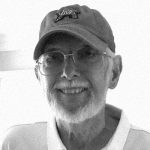
Continuous repetition of a word may cause the word to lose meaning, a psychological phenomenon known as semantic satiation. Say “travesty” 16 times: “Travesty, travesty….” Do it again. With each repetition, the word is drained of life, of meaning, of its capacity to cause discomfort, of its imperative to take corrective action, until it all becomes commonplace.
Back to the Table of Contents
Camelot Lost
By Joan Rudick

What a beautiful fall day it was in New York City. I woke up that morning with the excitement of a new bride living in a new city, hoping to find a new job. As I walked out of the darkness of the subway, on my way to a job interview, I noticed a crowd of people huddled around a car listening to the radio.
“What’s going on?” I asked,
“The President’s been shot.” What, how could that be? Our smart, young, handsome Camelot President is here in this country, in Texas, where he surely is safe from harm. It made no sense. I found a phone, cancelled my job interview, and rushed home to watch the news hoping that somehow this was a mistake, not true. Glued to the TV is where I remained for the next three days.
It felt surreal as I listened to Walter Cronkite, iconic CBS newscaster, fight back tears while solemnly announcing, “the President has been shot and has died at 1:00 p.m. CST, 2:00 EST.” What a stunning, shocking, overwhelmingly sad moment. So hard to make sense of, our President Kennedy had been shot, the country was in mourning, forever changed. Diminished was our sense of security, joy, innocence, naiveté—replaced by fear, insecurity, anger, distrust, dissonance as to who we were as a nation, and what would hold us together as a people.
It did not take long for a suspect to be found, Lee Harvey Oswald, who, while perched from a sixth floor window of a book depository overlooking the President’s motorcade, fired three fatal shots, killing the President and wounding John Connally, Jr., Texas governor at the time. Oswald was taken into custody, arrested. As he was led out of the courthouse, suddenly, he too was shot by a man in the crowd, Jack Ruby, a local nightclub owner. “He’s been shot!” I remember shouting out to my husband.
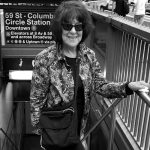
Now some 60 years later, we are a different nation, a violent nation. Gunfire on our streets is a routine occurrence. We are almost immune to the horror. Little did we know back then, in 1963, that not only would our Presidents be potential victims of violence, but that everyone, ordinary citizens, even our most innocent, our children, would become vulnerable.
How I miss Camelot.
Back to the Table of Contents
We Were Children. We Were Just Children.
By Ann Luard
That Friday in November, 1963 we were sitting at our sturdy wooden desks in our classroom listening to the radio. My teacher was in the front of the classroom looking serious and concerned. The show was interrupted by a news report telling us that President Kennedy had been shot.
Our President had been shot.
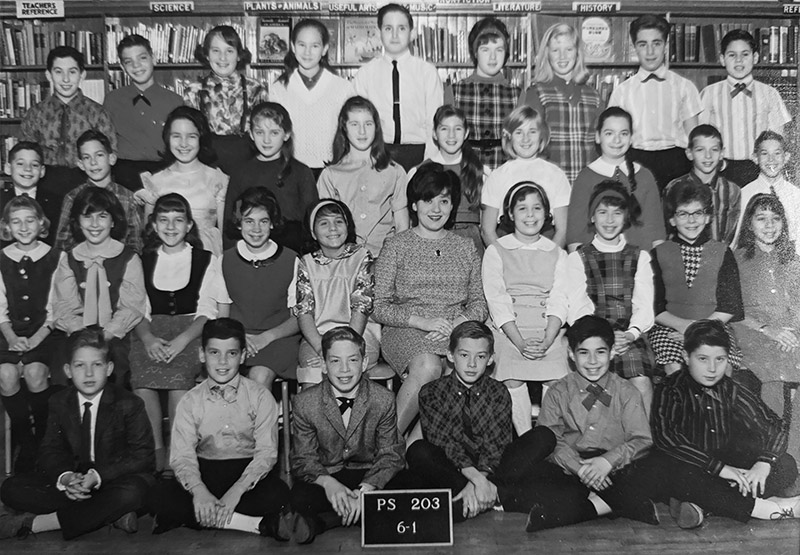
We were sent home early. The Brooklyn streets were quiet as I walked home with my classmate Judy. She was crying and telling me how her parents lived through the Holocaust and now this. I can see now that her family experience, her heritage of grievous loss, gave her the depth of emotion and understanding that my 11-year-old self could not possibly have understood. I was a young witness to history and totally unaware of how world events could impact my little life.
On television we saw the news footage: the crowds, the car, Mrs. Kennedy… Jackie, in her pink suit and pillbox hat reaching across the back of the convertible. Black-and-white blurry images sped across the small screen, the grassy knoll, the Book Repository, and later, Lee Harvey Oswald and Jack Ruby. Questions flew. All the answers were as blurry as the images. Sixty years later and we still have questions.
The lens of memory does not always allow us to see a clear and accurate picture. It shows us snippets of time like short clips of a movie strung together quickly, a movie trailer that makes you guess the whole story.
For example, we had been listening to a children’s radio program when an announcer broke in to tell us that unbelievable news. The theme song of this program was unforgettable. “Sing everyone sing! Sing everyone sing! All of your troubles will melt into bubbles. Sing everyone sing!”
It’s hard to believe that for all these years, my little-girl brain has conflated a lovely childhood memory with the terrible news of that day.
Back to the Table of Contents
Lost Weekend, 1963
By Sean McCarthy
I remember it was about 1:40 p.m. on a chilly autumn Friday. I had just finished the day’s classes at my high school. I was putting a few things in my locker and getting ready to leave for a weekend conference, when a guy I hardly knew hurried by, leaning in to say, “Have you heard the news? The President has been shot.” I hadn’t.
The “president”? President Kennedy? I was stunned. Then I heard the president was dead. How could this have happened? This was the United States of America. Presidents didn’t get killed in the United States. At least it hadn’t happened in a very long time.
The rest of that weekend remains vague. I hardly remember anything. I still went to a two-day conference a few hours away that I had signed up to attend. I don’t remember whether I went by bus or private car or who drove. I can’t remember who spoke at the conference or what they talked about. I do recall attending sessions in a medium-sized, windowless meeting room with fluorescent ceiling lights, beige curtains, and light brown carpet. The room had a few rows of metal chairs with fabric seats typical of chain motels. I didn’t see the few other boys attending from my school, and I didn’t know anyone else. I didn’t meet anyone my age.
At one point I talked with a couple of middle-aged men sitting in my row. They didn’t seem affected by the awful news. I don’t remember speaking to anyone else. I don’t remember what we ate or where. I wasn’t really thinking.
I spent every minute of my free time, and there seemed to be a lot of it, sitting alone in my room on a double bed with a beige- and orange-trimmed bed cover, watching what was happening in Dallas on television.
They had caught the alleged assassin, someone named Lee Harvey Oswald. Two days later, I watched another man named Jack Ruby shoot Oswald dead on live television, as he walked through a basement hallway at the Dallas Police headquarters.
What had been stunning had now also become bizarre. It was still a tragedy. A young, witty, charismatic, inspiring American president had been suddenly killed. He left a young, statuesque wife in grief and shock, two small children fatherless and uncomprehending, and a country in sadness.
How could this have occurred in my safe country of boundless freedom, goodwill, and prosperity? Things like this were not supposed to happen in the United States. We didn’t have assassinations. We never lost wars. We were the good guys, and everything always turned out well in the end. I was only 16 years old.
After that weekend the country didn’t feel the same, and I was no longer so naive.
Back to the Table of Contents
Where Were You on November 23, 1963?
By Julie Oktay
I awaken in the middle of the night to a loud, but almost musical call outside my window. What is he shouting? “Assasinato”? Where am I? Struggling out of a deep sleep, I start to remember that my friend and I had arrived in Rome the previous night. We came from Geneva on a train, unloaded our “VeloSolexs”, and found our way to our “pension” on “Via de Sangre de Cristo”, mostly by asking people for directions. The shouting continued, becoming softer and louder as the young man wound through the narrow streets. A newspaper crier, perhaps? What is he saying? “Presidente”? My friend, partially awake now, mumbles something. Perhaps some president was assassinated somewhere? Figuring this was the kind of thing that happens all the time in other countries, we go back to sleep.
In the morning, the pensionnaire, and old woman with long grey hair, wearing a house dress, jumps up to tell us something in excited Italian, her hands flying as she tries to convey her message. Was she saying that President Kennedy was assassinated? We must have misunderstood, since we speak no Italian and she had no English. We quickly decide to go to the American Embassy, to get the truth. As we arrived, we immediately saw that the flag was lowered. I got a queasy feeling in my stomach. As we got closer, on the entry door, we see a portrait of Kennedy framed in black ribbon. I am in shock! How could this have happened? Our beautiful young president, symbol of a new generation—OUR GENERATION—shot dead in Texas!
Over the course of the day, we gradually accept this horrible information. Our focus returns to our own adventure. We had convinced our college (Antioch) to give us credit for a two-month project on the History of Western Painting in Rome, Florence and Paris. The next day, we get back on our bikes and head to our first stop, a small obscure church to begin our project, forgetting about the assassination for the time being.
It was not until I returned home two months later that I saw the images on television. The parade route, the grassy knoll, Jackie’s dress, Walter Cronkite’s tears, Johnson being sworn in, Ruby shooting Oswald, the horse-pulled coffin, John-John’s salute.
Thus began a new era, for me personally and for the country. It would be a time of political awareness and activism. I felt that I was an adult now, and I had a part to play. It seemed to me that Kennedy had passed his torch to me and to my generation. We joined the fight against hate, inequality and war.
I’m still fighting!
Back to the Table of Contents
November 23, 1963
By Betty Spear
That morning with the kids off to school and my husband off to work, I told myself it was a good day to sew. After I finished my usual morning chores, I hiked up to my attic workroom and became absorbed in my latest project. Time passed peacefully and before I realized it was three o’clock. Almost time for the children to come home.
Soon they burst through the door, each exclaiming the dreadful news, “President Kennedy’s been shot!” How does one explain this to three young kids? The youngest had asked me who shot his deceased grandpa—a man we knew had been shot and killed so he thought guns killed all people.
I thought, oh no, this can’t be. But of course, it was confirmed when I turned on the TV. My husband came home, and we spent the rest of the day in a state of shock and glued to the TV.
The next day I went grocery shopping. My reaction to a sense of uncertainty and urgency made me think we needed to have plenty of food on hand. It felt as if the whole city had shut down. A morbid silence gave me a guilty feeling for leaving the house.
The nation’s mood had greatly changed since the summer of 1960 when we were vacationing in Hyannis, Massachusetts, where large crowds of enthusiastic people gathered to cheer JFK as he boarded the plane headed to the Democratic National convention and on to the presidency.
Who could have predicted his destiny?
Later, as I watched Lee Harvey Oswald being transferred to a different location, I witnessed his killer step out of a small crowd, pull out a pistol to shoot and kill Oswald.
By then, it was one more despicable shock to a country already in mourning.
Back to the Table of Contents
My JFK Remembrance
By Carole O’Keeffe
I was a junior at Tahoe Truckee High School and taking my third year of French with Mr. Vick, an older bachelor teacher. I lived in a small village of 36 houses. We had no television.
We were all shocked and saddened when Mr. Vick announced the tragic news that President Kennedy had been assassinated. I remember feeling overwhelmed with sadness for our country and for John and Jackie Kennedy.
When we were in the eighth grade we had composed a campaign song for John F. Kennedy. I don’t remember the exact words of the song, but I remember the upbeat message. Nor, do I remember the television programs showing the funeral, since I did not see them. But the memory of Mr. Vick announcing the shooting of JFK has stayed with me all my life.
Back to the Table of Contents
I Don’t Understand You People.
By Ann Sokatch
I had recently graduated from college and was returning from a training session for my new job. We were getting ready to cross 7th Ave. and 54th Street in Manhattan to get back to our office at the New York State Employment Service.
Someone told us the news that
JFK had been shot and of course
we wouldn’t accept the fact that
it was true.
When we got back to the office, all was quiet as if everyone was in shock, except for Maria who worked with us.
She was emotional and exclaiming, “In my country everyone would be carrying on, crying, talking, and trying to make sense of the situation. What is the matter with you?” Maria was from Puerto Rico where demonstrating emotions was accepted and expected. The difference between our cultures was evident.
Back to the Table of Contents
The President Was Killed; the President Was Killed
By Ethel Brandt
I was living and working in Pittsburgh, Pennsylvania at the time.
Someone in the building started screaming “the President was killed; the President was killed.”
I ran down to her office and stood there shocked. The director in the building told us all to go home. I must say, it was pretty upsetting and frightening.
Back to the Table of Contents
People on the Street Crying
By Suresh Arora
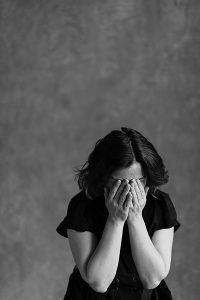 I was in New Delhi, India and only 14 years old. India had just come off a war with China in October 1962, where it was humiliated. India and the USSR were close, with people chanting that the two countries were brothers.
I was in New Delhi, India and only 14 years old. India had just come off a war with China in October 1962, where it was humiliated. India and the USSR were close, with people chanting that the two countries were brothers.
I do recall my paternal grandfather, a handsome man, with his shoulder-length silver hair, who had never received any schooling, asking me about America’s involvement in Vietnam.
India at that time was one of the blocs of countries that called themselves non-aligned. My grandfather would go to a neighborhood park where the seniors would discuss politics, something I did not much care for or know about.
Only seven cities in India at the time had television, Delhi being one of them. We were one of the proud families of a black-and-white set that would bring some of the neighbors over for a couple of weekly programs.
Mrs. Kennedy had visited India in March of 1962 with her sister, and charmed the entire country by her grace. According to the news, the coverage was about her fashion (she wore 22 different dresses) and her interest in arts/culture. She did a lot of goodwill for Americans. John Galbraith, the ambassador to India, was the host. Prime Minister Nehru was so charmed by her that he kept one of her pictures in his study for the rest of his life.
Even back then I was a romantic—been one all my life, I guess. But I was not into her since I have very fuzzy memories of the coverage, if any. We were supposed to learn English starting in the ninth grade. Here I was in the tenth grade but had not received any formal education in English.
At the suggestion of one of my neighbors, I would buy copies of four daily newspapers in English that were published daily in Delhi. Yes, we had four papers with high-quality journalism—one of the positive leftovers from the British Raj. Per my neighbor’s suggestion, I would read the editorial and opinion sections with a dictionary beside me. And, I subscribed to Readers Digest for vocabulary. I was self-taught in English and felt comfortable reading literature.
When I read the news of President Kennedy’s death, I remember crying. By that time everyone had heard the news on the radio, television broadcasts were only in the evenings. I remember people on the street crying. Indians did not care for the US, but loved American people and their President!
Prime Minister Nehru gave a heartfelt speech on the television that evening. He was hoping that President Kennedy would help India out in its conflict with China and now there was a sense of despair in the political circles.
In the words of the Political Officer at the American Embassy at that time: “President Kennedy’s death had a tremendous impact [on India]….I for the next three years was the deputed person to go out and meet Indians of all types and levels of society and education, who came in bearing the most extraordinary range of gifts for Mrs. Kennedy usually, sometimes for the United States in general. These were almost always things that were handmade, and they were about President Kennedy or pictures of President Kennedy, articles about President Kennedy, poems to Mrs. Kennedy or to the children. I have seen his face woven into cloth, painted on things, wood-crafted, just an extraordinary range from the sublime to the ridiculous, but all very heartfelt.”
We had a memorial service for him in the Anglican cathedral in town. The mob was tremendous. The church was absolutely packed, and there were people outside, and everyone wearing white. White in India is the color of mourning. People stopped you on the street to say how sorry they were. The outpouring from India was absolutely tremendous.
President Kennedy grabbed the imagination of the world, certainly of the Asian world in a way that perhaps no one else had done, as far as I know, until that time… We were joined by the love of many, many thousands of people in Bombay over the death of President Kennedy.
Back to the Table of Contents
Her Pink Chanel Suit Splattered with Blood
By Phyllis Geiger
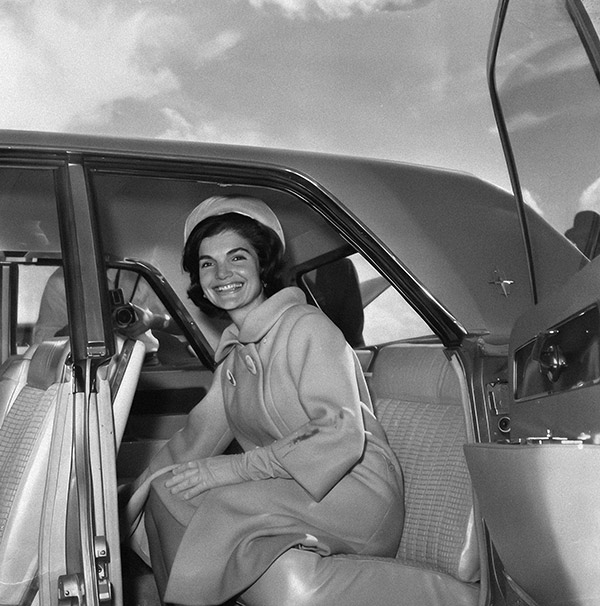 On that November day, I was only several minutes into my session with my one o’clock student when a teacher assistant came and whispered, “The President has been shot.” I was frozen into shock, but I needed to stay calm for my mentally challenged student.
On that November day, I was only several minutes into my session with my one o’clock student when a teacher assistant came and whispered, “The President has been shot.” I was frozen into shock, but I needed to stay calm for my mentally challenged student.
I was in a Special Education Center in Prince George’s County where the curriculum taught functional daily living skills, personal care, and social skills. Because my student was blind, I was working one on one with her three afternoons a week.
By the time I finished with my student, I heard Walter Cronkite, CBS anchor, announce that President Kennedy had died. It would take me several days to register the loss of this young president who provided so much inspiration and hope for the country.
Immediately following the shooting, television coverage was primarily focused on Dallas, Texas and the assassin. Live coverage was provided as Vice President Lyndon Johnson was sworn in as President with Jackie, the First Lady, at his side in her pink Chanel suit splattered with blood. I remember biographies of Kennedy’s life, cameras at the Rotunda where his body lay in state, and re-runs of his inaugural address.
School was cancelled for the week, as I recall, and I continued to watch many of the events but would turn them off periodically as it was all very sad. My husband and I went to view the casket in the Rotunda late at night when the lines were short. I still remember the funeral procession through the Capitol to Arlington Cemetery with the riderless horse, and the casket with Kennedy’s remains.
The picture of Jackie and the children with John-John saluting his Dad is historic. She was stoic with the black veil covering her tears. The children followed by her side, quiet and obedient, not understanding the loss of growing up without a father.
I think the impact of the assassination of President Kennedy was profound to many of my generation. I remember my grandmother telling me she thought he would make a good president but she was concerned that he was so young. He challenged those of us who were still bit naive in believing in our leaders.
Back to the Table of Contents
A Dirge for JFK
By Elizabeth Levy Malis
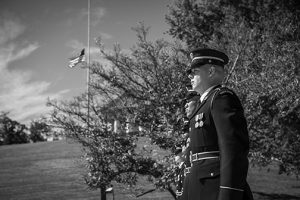
I remember nothing about November 22, 1963, the day President John Fitzgerald Kennedy died. I have a good reason. I was four years old, going on five.
Still, emblazoned in my memory are images I saw on my parent’s heavy, blocky, boxy, black-and-white TV set, which occupied a place of honor in our back room with the blue sofa.
I remember images of JFK’s funeral parading across the TV screen and across my memory banks, carving indelible tracks. As I said, I was just shy of my fifth birthday when he was shot. My birthday is November 24, the same day as the funeral. Maybe it’s because it happened on my birthday that I will always remember the funeral after this national tragedy. Maybe it’s because everyone does.
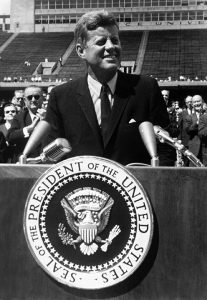 No matter, I could feel the sad mood of the country in our little house’s back room. The TV, which in our home was rarely on during the daytime, played the funeral ceremonies nonstop. The grey-scale images source from another time, standing in full contrast to the crisp, superpower sharpness on HDTVs today.
No matter, I could feel the sad mood of the country in our little house’s back room. The TV, which in our home was rarely on during the daytime, played the funeral ceremonies nonstop. The grey-scale images source from another time, standing in full contrast to the crisp, superpower sharpness on HDTVs today.
I remember the marching, the military honors, his widow, and his little children—but mostly I remember the black riderless horse with the backward boots. It fascinated me. The boots more than the horse, which my parents kept calling by its name, Blackjack. My memories of Blackjack are not static, but a moving picture; the horse prancing and dancing at the end of its handler’s rope. The TV news man said the horse was “spirited” and “difficult to handle.”
But never mind the horse. I keep asking my Mom why the boots are on the horse backwards. I recall she said something like “that’s what they do when a fallen leader dies.” Reversed, empty boots, dangling down in the saddle’s stirrups. “Who thought up that? And why?” questioned my newly minted five-year-old brain. These particular boots from JFK’s funeral were shiny and polished, all the same going the wrong way. I wanted to reach through the TV set and turn those boots around.
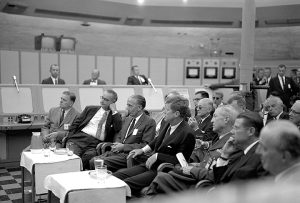 I have since learned that this tradition dates back to before Genghis Khan, when a riderless horse wearing empty backward boots in a funeral ceremony embodies a rider’s last journey as they look back on loved ones. Abraham Lincoln counts as the first US president to be honored with the riderless horse at his funeral procession. The black riding boots were reversed in the stirrup irons to signify a fallen leader looking back on his troops for the last time. More research reveals it illustrates a deceased rider looking back at his life. Finally, it remains the symbol of a fallen leader who will lead no more.
I have since learned that this tradition dates back to before Genghis Khan, when a riderless horse wearing empty backward boots in a funeral ceremony embodies a rider’s last journey as they look back on loved ones. Abraham Lincoln counts as the first US president to be honored with the riderless horse at his funeral procession. The black riding boots were reversed in the stirrup irons to signify a fallen leader looking back on his troops for the last time. More research reveals it illustrates a deceased rider looking back at his life. Finally, it remains the symbol of a fallen leader who will lead no more.
But as the funeral procession rolled slowly from the White House to the US Capitol in 1963, the vacant, backwards-facing riding boots drew my focus on that dark horse following the president’s casket upon a cart pulled by a team of white horses. I hoped no one I knew had to have those backwards boots when they died. Or me for that matter.
It seemed a haunting tradition.
It still does.
Back to the Table of Contents
“I Like Ike” Buttons
By Margaret Weiss
On November 22, 1963, I was just 20 years old and had not been old enough to vote for John F. Kennedy in 1960. My mother was a staunch Republican, so his name was rarely mentioned with much enthusiasm. In contrast, I have vivid memories of her involvement in the Eisenhower versus Stevenson election in 1956, as we all sported “I Like Ike” buttons. I would imagine that the choice of Richard Nixon was not an easy one for her, and ultimately, I am not sure whom she voted for.
On November 22, 1963, I was a student at New York University, Washington Square College. My classes started early on Fridays and I enjoyed my walk from my apartment through the small streets of Greenwich Village. I always looked forward to crossing Washington Square Park, taking in the smells and sights of each season and the sounds of the city coming to life. On most days I would walk past the imposing statue of Giuseppe Garibaldi mounted on his horse, attempting to draw his sword. There was an urban tale among NYU students that Garibaldi would draw his sword if a virgin walked past. These were the things that seemed important at the time.
It was early afternoon when my classes let out and I was moving very slowly through a hallway in the Main building, an imposing high-ceilinged, marble-walled space. I heard someone say “the president was shot.”
Those words seemed to echo off the walls and ceiling. I thought, no, this cannot be true. President John F. Kennedy represented the hopefulness of our generation and of the country. We had lived through the harrowing experience of the Bay of Pigs episode, which left us with a sense that he ultimately would not risk a nuclear war, and that he truly desired that we show what we could do for our country.
As I left the main building, groups of students and professors gathered together and shared sorrow and disbelief. We did not know at the moment that the president was dead. Later, on learning that he had died, an overwhelming sense of sadness and helplessness enveloped me.
I walked through Washington Square Park, surrounded by bare grey trees and the imposing statue of Garibaldi, no longer wondering what would happen or not happen with Garibaldi and his sword. The area around the fountain, in the middle of the park, was usually vibrant with guitar music and song.
All I heard were quiet voices as people around me shared their disbelief and grief, each in their own way. I felt both alone in my grief and yet aware that this was a shared experience of a day that no one could ever have imagined.
As the day wore on, heart-wrenching scenes of Jackie Kennedy bent over JFK’s body, her Chanel suit splattered with his blood, were played and replayed on televisions around the world.
The ensuing days were like a very bad dream, filled with scenes of the shooting of JFK, the shooting of Lee Harvey Oswald, and the somber funeral procession to Arlington National Cemetery.
The image from the procession of the riderless black horse remains vivid in my memory. Horses in my experience are so attuned to the emotions of those who are close to them. This lone horse seemed to carry the weight of us all.
Back to the Table of Contents
To All Who Remember Those Aching Few Days
By Fred McCormick
In the mid-1960s, my grandmother told me that in 1914 an official of the schools in the district of Pennsylvania, where she was working, told her that Austria-Hungary had declared war on Serbia that day. She related that she “could hardly grasp” what this implied. And then the dominos began to fall…
Something similar happened to me on the afternoon of November 22, 1963. I was walking in the halls of my junior high school to the final class of the day. There was a growing tension among the students around me. My mood became uncertain, a little frightened until a friend filled me in.
“Have you heard—the president, the vice-president, and the governor were all shot today?” Being a New Yorker not up on my current events, I thought he meant about Rockefeller. I cannot determine how this news spread to the students in my school. The building was a closed system, with no cell phones or instant online information. Perhaps some of my peers had been furtively listening to transistor radios in class and had heard the news.
Like my grandmother, “I could hardly grasp,” let alone process this information. Then the dominos began to fall…
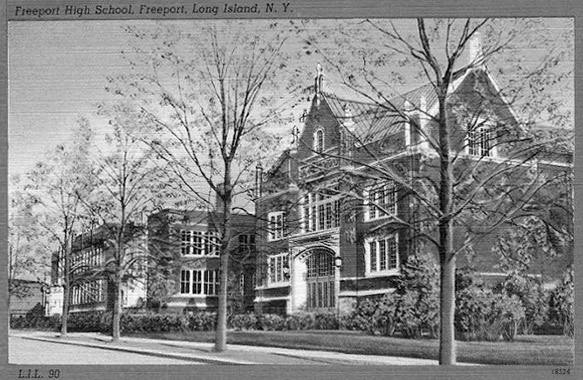
Once settled in class we talked about what we had heard. One classmate, who seemed serious and practical, suggested that we were dealing with exaggerated rumor when he said “Maybe somebody just took a shot at him.” But shortly after, the assistant principal came on the PA system and announced in a halting voice that Kennedy had indeed been shot and “was in critical condition.” School was let out for the rest of the day.
I walked home with my brother and a friend. We talked and the conversation was calming though we speculated on what might have happened. Everything was made plain when we reached home. Kennedy was dead, Johnson was president, and the governor of Texas, John Connelly, was wounded.
The Long Island newspaper, Newsday, put out an “extra” with all the latest material and substantial background information. I had never seen something like that before, nor have I since.
Thus began one of the longest weekends of my youth, which I longed to end but needed to endure. The sordid details were repeated on television in an endless loop: the arrest of Lee Harvey Oswald; the killing of Officer J. D. Tippit; Oswald’s own assassination at Dallas police headquarters by Jack Ruby. There were so many sad moments—the funeral itself, little John Jr. saluting the flag, Mrs. Kennedy’s stoic resolution. Of the disorderly procession of Heads of State, Charles de Gaulle stood out, literally, head and shoulders above all the others. All who remember those aching few days will have their own take on what went on.
The shock—the “could hardly grasp” reaction—was a loss of orientation. All logical reason had been thrown out a window. In 1914, Europe had not suffered through a general war in a century; the Civil War had settled the South’s hash and supposedly resolved the festering wound of slavery; the Whig view of eternal historical progress was dominant until that fateful summer. For “Baby Boomers,” want had been defeated after the Great Depression, and evil had been conquered at the end of the Second World War. Our seniors had saved the world for us, and we would live in peace and plenty forever. Our Whig view of history was secured. It was unthinkable that such disruption of our sheltered Weltanschauung could occur and how fragile every material certainty was.
With the rest of the 1960s standing witness, I learned fast. Some consequences of that terrible day were well intentioned but superficial: the censorship of Frank Sinatra’s Suddenly and bits of comic dialogue that referenced Kennedy’s PT service on McHale’s Navy; and the endless renaming of parks, airports, and other landmarks. I have always felt an ironic sadness at the downturn of Vaughn Meader’s career. Others were crazy, like the interminable and semi-rational conspiracy theories about who was behind the assassination—everyone from LBJ to Michael Corleone.
But the world has certainly not been pleasant or optimistic these past 60 years. Would it have been different if Kennedy had been a two-term president? A legendary heroism was constructed about his administration after his death. He became an icon of the ideal of “American Exceptionalism.” This view has been tarnished. There is certainly no longer a viable “Whig view of History.” I have read that Kennedy’s assassination brought the end to American innocence. But I have also read that the television quiz show scandal did the same. One inclined to The Dark Side, and familiar with American history, could reasonably ask in a nonpartisan way just how much “purity credit” was remaining to be drawn upon by 1963. He might even compose a long, mirror-image Whitmanesque anti-poem, based on this theme, and insert any atrocity, massacre, land grab, war, crime, injustice, riot, or persecution before the question “how much innocence was left to lose?”
Americans are concrete, not inclined to enter into and come to terms with the mystery of the contrast between our ideals and the blunt historical narrative which can make many of these ideals seem hypocritical. I have no ability to argue against this viewpoint.
I will bring up one noteworthy paradox regarding November 22, 1963, which should provoke reflection about the significance of earthshaking events that belie our most cherished certainties, the loss of innocence, and the decay in this world of the Good, the True, and the Beautiful.
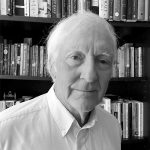
C. S. Lewis, a sincere Christian apologist, also died on that day.
Juxtaposing these losses and thinking in terms of metaphor, not dogma, I would ask a final question (not originally mine) for all who shared those dreadful but indelible moments: “Which is more important, the Passion or the latest wretched headline?”
Back to the Table of Contents
A Fall When Tears Fall.
By Charles E. Sternheim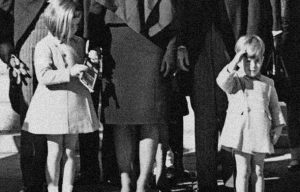
A fall when tears fall.
The sun barely shows its face.
When Jackie wears black.
A fall when tears fall.
Dreams stare into the unknown.
When the nation mourns.
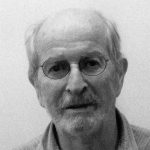
A fall when tears fall.
Hopes lose balance and collapse.
When smiles are delayed.
A fall when tears fall.
John Jr.’s final salute.
Little John stands tall.
Back to the Table of Contents
The Day Kennedy Died Every Teletype Machine in Metro Clanged Out at Top Volume
By Maurine Beasley
I don’t have much recollection of the day that John F. Kennedy died, it emerges in my memory as an enormous blur. What stands out vividly is how much it impacted my sense of order and left me uncertain about the future of the United States itself.
I do remember getting the news at The Washington Post where I was a very green “girl” reporter—in those days’ women journalists were not taken seriously and their assignments were highly gendered. I covered education, which put me in the Metro newsroom with men, not in the Women’s Department where most of the women journalists were congregated, writing about food, fashion, and furnishings in the context of Washington social life.
When Kennedy died, every teletype machine in Metro clanged out at top volume. Everyone in the room raced toward the back wall with its bank of teletypes to read every word of the awful news from Dallas. I ran to join a small group clustered around one of the machines. For the most part no one said anything, we were too shocked. Then—and this I do recall clearly—one women reporter spoke up, “That will make Bobby Kennedy the next President of the United States.” She covered welfare, a beat like education that was considered suitable for women. I admired her greatly, she wore beautiful clothes and was highly regarded for her journalistic skills.
Her comment, which fit in the vein of “The King Is Dead. Long Live the King,” surprised me at the time. I later learned her husband had a significant job at the Department of Justice and was close to Robert Kennedy. Looking back now, I wonder if her remark did not display an unseemly crassness of ambition that came to forefront before any outpouring of grief and/or outrage.
As for me, I did not know what to make of the assassination. I simply was stunned. Some people in the office cried, others probably prayed. Since I was not considered expert enough to join most of the staff in covering the local angle of the tragedy, I went home and watched every minute of the news from Dallas broadcast on a pint-sized black-and-white television screen. I could not believe it when Jack Ruby shot Lee Harvey Oswald. What had my country come to?
I was a country “girl,” raised in a small town in Missouri. My parents were rock-solid Republicans. I had listened on a car radio to the debate between Nixon and Kennedy during the 1960 election campaign and voted for Nixon. I could identify with Pat Nixon, who had worked her way through college.
I thought Nixon was a tried-and-true public servant, whereas I wasn’t that taken with his lesser-known challenger whose family encompassed a fortune and whose wife, Jackie, seemed remote and consumed by her wardrobe. I heard the debate driving from my small home town to Kansas City where I worked on The Kansas City Star newspaper. After I moved East to go to the Columbia University Graduate School of Journalism, my horizons broadened and I absorbed the liberal Democratic values of my associates. Still, I hadn’t totally made up my mind about the Kennedys.
That changed when I saw Jackie walk into St. Matthew’s Cathedral holding the hands of her two little children for her husband’s funeral. I was quite close to her because The Post had stationed me with another junior reporter along the route of the funeral procession to watch for any unforeseen events. Jackie personified a tower of strength, dignity and compassion as she moved into the church.
At this point, I realized the symbolic importance of the youthful, elegant Kennedys to the American nation and how disastrous the assassination had been.
Back to the Table of Contents
Words Helped Me to Survive
By Judy Ashley
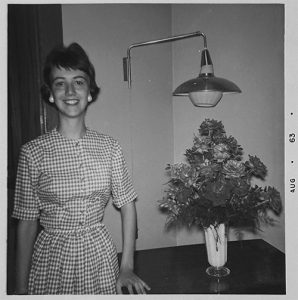 I know exactly where I was on November 22, 1963, in a car coming home from college classes with the newly widowed neighbor lady who had the radio playing low.
I know exactly where I was on November 22, 1963, in a car coming home from college classes with the newly widowed neighbor lady who had the radio playing low.
“I cannot figure out if you do not have an accident, how you can make the rate go lower. My husband always took care of these things,” my driver spoke but maintained her focus on the road. She did not get her license until she got her job in the florist shop after her husband’s death. “I do not think I should have to pay so much.”
On the radio, someone shouted, “…Shot….oh, no, Jackie is crawling…she is….what has happened…. Shot?”
I turned the radio volume up. The announcer kept saying, “Shot? Oh, my god, there is blood all over her skirt! What happened?”
During the rest of the drive to our neighborhood, we listened to the radio and the events in Dallas, neither of us saying a word. When we reached my house, she dropped me off. I jumped out and hurried to the front door.
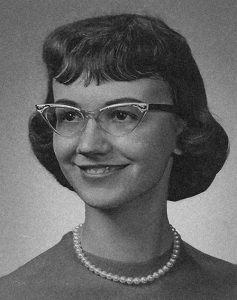 My mother was not home from her work yet. I rushed into the house and turned on the television. Sitting in the brown chair nearest the television, I stared ahead. Mom arrived home and without a word, took a chair. Words did not seem available.
My mother was not home from her work yet. I rushed into the house and turned on the television. Sitting in the brown chair nearest the television, I stared ahead. Mom arrived home and without a word, took a chair. Words did not seem available.
I knew part of the shock I felt was related to the death of my sweet grandmother one year ago. When I visited her, she inquired about my boyfriend; she worried about my young age. She asked about my classes. She asked about my dance classes, because she wanted me to pursue musical comedy on a professional level. She died on November 20, 1962. Two days before, we had acknowledged the one-year anniversary of her demise.
On that anniversary, I cried much of the day. I missed my grandmother. I did journal, my outlet for my emotions. My journaling included recollections about my father, too. He died three months after my grandmother from pneumonia complications. Now there was this assassination.
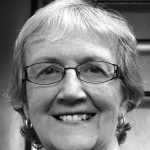
Everyone around me sobbed: My former roommate in the dorm, a classmate, the cashier at the grocery store, and even the gas station man. None of them spoke; few words existed.
For many weeks I essentially felt numb. The constant news about the assassination triggered emotions related to my own losses. I journaled.
Back to the Table of Contents
It Was the End of Camelot
By Karl Clemmensen
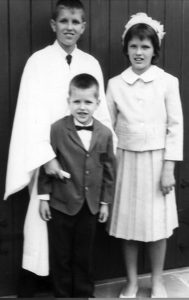
I was six years old, clueless, and frankly uninterested in current events. This tiny bubble I lived in, shielded me from the bad things going on in the world, things that a six-year-old didn’t need to be upset with. Things that we weren’t old enough to process. Parents instinctively do that, guard and protect their young children and avoid exposing them from the horrible things that happen in the world.
I was lucky to have grown up in this idyllic childhood upbringing, with caring, loving parents. My older brother and sister, whom I secretly cared about, would tease me since I was the youngest. Relentlessly picking on me till I had enough. Then I would scream threats like “I’m telling,” which usually de-escalated the current battle and brought peace in the house. They knew I would tell, and there would be consequences if they didn’t stop.
The youngest would often win small battles like this. Yes, I was a momma’s boy, but that was all changing rapidly. I had stopped clinging to her skirt and was showing all the signs of male independence. Mom would bring my shoes, bend down to start to tying my shoes and I’d say, “I can do it”. I would awkwardly accomplish the task bringing a smile to my face while declaring “I told you mommy” that melted her to bend over with a hug and in a loving tone whispering “good boy,” a reward that swelled me with pride as I was always determined to make my mother proud.
It was a serene household in the suburbs, where most of what I comprehended as newsworthy was either derived from my parents or siblings. Little information came from my first-grade schoolmates, who were as naive as I was. My teacher simply stuck to the curriculum and her lesson plans while never talking about current events.
I was isolated from the happenings of the world as most of my young peers were. All we really cared about was recess and playtime. We all shared a desire to simply play, not listen to the radio, not read the newspaper and (other than cartoons) didn’t watch TV. There were no cell phones, computers, iPads, or any technology to let us comprehend what was happening out in the big scary world.
This November day was very different, I could tell something horrible had happened. I was frozen and nervous as I observed something very uncommon. My mother, who was not quick to cry, was now sobbing heavily into a lace handkerchief. Soon after, my father hurriedly burst in from work, walked through the door and rushed to hug my mom. This made me anxious.
They never showed public displays of affection or hugged in front of other people. That was the custom and the time we lived in, but it had been violated. Still hugging, my father who never cried or show any sign of weakness, put a finger to the corner of his eye to wipe the moisture building up.
Something very bad had happened and nobody was telling me anything. So, without any information, I started to guess, and tears started to come, staring at my parents while I continued to guess. Did someone have cancer? A word I didn’t fully understand but somehow, knew it was associated with death. Are my brother and sister sick? Grandparents? Were we moving away, separating me from my friends and classmates? Was my mother or father dying? Oh my God, was my small world threatened?
The more I pondered all this, the bigger my tears grew, as my mother looked down and suddenly noticed that I was very upset, compelling her to bend over and mutter “something terrible has happened…” with pauses to sniff and wipe her eyes, every other word would finally break the news “….the (sniff), the president, (sniff) has been shot” …dropping her head back deep into her handkerchief again. Our President JFK was assassinated. My parents loved the Kennedys as I would grow to understand more and more.
Looking back on that time, I am ashamed. But in the moment, I immediately felt relieved. I was too young to process the tragedy and all I knew was that it didn’t disturb my small world and, from the perspective of a toddler, I was selfishly thankful that it was something that didn’t touch my tiny realm. A childish assessment I would grow out of. But at this moment, nobody, or anything in my small world at that time was affected.
Feeling composed again with this childish deduction, I looked up to her and now suffered a new kind of sadness, my mother was still crying. It hurt me to the core, as I just wanted her not to be sad. Patting her on the thigh, trying to console her now, I said, “It’s OK mommy, it’s ok” and she was basically melted by my concern and briefly composed herself enough to bend down and give me a hug. “Thank you, sweetie,” and with that embrace, I was all better. Snapping back to my world, “Mommy, can I go outside and play?” … I had fully recovered.
For the weeks following, my parents were glued to the TV, as I would be forced to watch the news for several weeks and watch the replays and news coverage of the aftermath, rehashed over and over. No cartoons for me, was all I could think of, since we only had one TV. My prospective would eventually evolve. I gradually appreciated the significance, but the real gravity of the event wouldn’t sink in till later, when I would mature day by day. That terrible event would grow to be more tragic the older I got, the more I learned about that horrific day, the more I would come to understand what a true tragedy it was.
As it would come to be said later, “It was the end of Camelot”.
Back to the Table of Contents
Blackjack, the Feisty Riderless Chestnut Quarter Horse
By Dottie Lopez
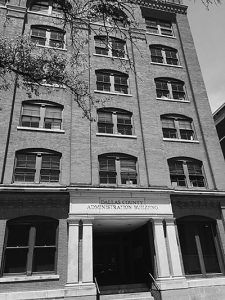
While I sat at my desk in second grade at Notre Dame Preparatory School, we heard an announcement over the public address system that President Kennedy had been shot. Shortly after, the principal dismissed classes. Our mother picked up my sister, who was in seventh grade, and me.
Unlike a typical Friday when we chatted with her about our day, a somber quiet hung in the car as she clenched the steering wheel with both hands. We arrived home and Mom turned on the TV in our living room that was adjacent to the kitchen. When she learned that Kennedy had died, she gasped, and her eyes welled with tears. I heard her pick up the tan wall phone in the kitchen and dial. She sobbed the news to my father.
For days, we watched the events unfold. It seemed that Mom didn’t want to miss a moment. She listened to the audio as she prepared meals in the kitchen or dusted furniture. When my sister and I played jacks and pick-up sticks, we sat in front of the TV, viewing the drama that included Jack Ruby shooting Lee Harvey Oswald on live television.
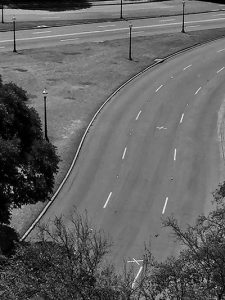 During the funeral procession, spectators, several-deep and many dressed in overcoats and hats, flanked the streets. Individuals blinked back tears, grasped tissues, or covered their mouths in distress. Others stared down as if in prayer. Both military personnel and civilians saluted the caisson that held the president’s body.
During the funeral procession, spectators, several-deep and many dressed in overcoats and hats, flanked the streets. Individuals blinked back tears, grasped tissues, or covered their mouths in distress. Others stared down as if in prayer. Both military personnel and civilians saluted the caisson that held the president’s body.
Though I somewhat understood the gravity of the situation, my sister and I discussed what felt familiar. As equestrians, we liked the horses. White horses that preceded the caisson, decked out in black breast collars, blankets, and saddles, fascinated me. But Blackjack, the feisty riderless chestnut quarter horse, impressed my sister. He pranced, tossed his head while trotting sideways, pulled at his reins and chomped his bit as if the crowd unnerved him. When we learned that the empty riding boots placed backwards in the stirrups represented a fallen hero, our banter softened.
For me, the image of Jackie, beautiful and stoic behind the black veil, as she held her children’s hands outside of the church, remains stamped on my memory. I couldn’t imagine losing my father and wondered what the Kennedy children were feeling. When John Jr. saluted the casket, he seized our hearts.
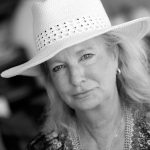
In 2018, I visited the former Texas School Book Depository in Dallas, now the Sixth Floor Museum at Dealey Plaza. I saw the two Xs on the street that marked the scene where Oswald shot Kennedy. Inside, the photos, home movies, newspapers, posters, and numerous artifacts that portrayed Kennedy’s life and death amplified the significance of the events that I didn’t comprehend when I was seven.
On the sixth floor, the re-created scene included boxes stacked to conceal Lee Harvey Oswald where he perched his gun in the window waiting for the motorcade. When he shot the president on November 22, 1963, the world changed forever.
Back to the Table of Contents
We Became a People Who Mourned for What Could Have Been
By Barbara Pallas
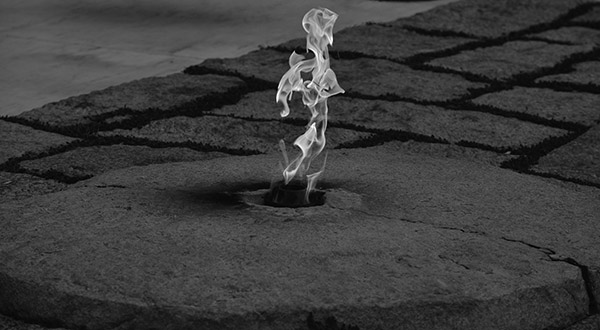
I have celebrated numerous birthdays, anniversaries, graduations, and weddings—each special and memorable as joyful occasions with family and friends. There is laughing and storytelling within those wonderful moments that we share with those we love. The brain is a huge file cabinet, with the top drawer being readily accessible and holding the good memories that are stimulated by an occasion, a picture of a loved one, or by visiting a place that invites memories into the present.
But the bottom drawer holds those remembrances that are only pulled forward when a particular date appears on the calendar or when an assignment to write about a particular topic is announced. For many of the “Baby Boomer” generation, the day that President John Kennedy died, and the days immediately following his assassination, turned a usually non-memorable day into one that cannot be forgotten.
In November of 1963, I was a 13-year-old freshman at The Catholic High School of Baltimore. My ordinary school day consisted of Homeroom and then my classes of Religion, English, Art, Algebra, History, and Home Economics. After an uneventful morning, my first class after lunch was interrupted by an announcement by Sister Lucetta, our principal, over the school’s intercom that President John F. Kennedy had been shot in Dallas, Texas.
Her voice cracked as she led our prayers for his recovery. John Kennedy was inaugurated in 1961 as the first Roman Catholic President of the United States. During his presidential campaign in 1960, there were many who thought that the Pope would run the United States if a Catholic President was elected. Not long after the first announcement, came the second one saying that President Kennedy had died of his wounds.
I recall the absolute quiet that came over the classroom as each of us tried to process what had happened. It seemed unreal because John Kennedy was a young man with a beautiful wife and two young children, and he had been assassinated, which was a new concept for me and my friends to understand.
Death was abstract to me in 1963. I knew it was a part of life because I was a member of the choir in Catholic elementary school and sang at many Requiem High Masses. I watched the emotional turmoil of the deceased’s families, but I felt none of their distress. Sadly, my pre-teenage brain viewed it as an opportunity to be excused from classes for an hour. On Friday, November 22, 1963, death became real.
We were dismissed early. I recall standing on the bus stop, leaning against a wall with my arm full of books and observing my surroundings, people drove past like it was a normal day, customers at the nearby produce stand were buying fruits and vegetables, the car dealership where I stood had customers inside. It was weird, I thought. Did they know that President Kennedy had been shot and died? Was it real?
As I entered my house, the scope of what occurred began to set in. My mother was in front of our black-and-white TV holding a tissue while my almost-three-year-old brother played with toys on the floor. She stood up and hugged me and mentioned that I was home early likely because of what happened in Dallas. I had an aunt and uncle who lived there, and my mother told me that my dad had made a long-distance call to him, an expensive thing in 1963, an indication of the importance of this day. I do not recall any in-depth conversation with either my mom or my dad about what occurred. However, I remember the phone ringing often, with all of the conversations being about what occurred in Dallas. Our television was tuned into the news which played on every channel as the graphic pictures of Jackie Kennedy’s suit, stained with the blood of her husband, was a first glimpse into the horror that would play out over the next days.
I was glued to that screen where I heard the names Lee Harvey Oswald, J. D. Tippit, and Jack Ruby for the first time. I knew that some bad people had done a horrible thing and that our young and beautiful First Family would never be the same. And neither would our country. I watched the funeral. I heard Hail to The Chief played over and over and to this day I think of President Kennedy every time I hear it. I watched the pain on the faces of the Kennedy family as they followed the caisson down Pennsylvania Avenue.
I was mesmerized by the pageantry of a state funeral that included a riderless horse carrying a pair of polished, spurred boots placed backwards in the stirrups of the saddle to signify the death of a warrior. I watched as Jackie Kennedy held the hands of her two children, Caroline, and John-John and through the television’s lens I witnessed the unforgettable and heart-wrenching salute of a young boy who was going to miss his father for the rest of his days. I witnessed the motorcade to Arlington Cemetery and watched as our President was laid to rest under an eternal flame.
In the spring of 1964, my dad drove our family to Arlington Cemetery to visit the gravesite of President John Fitzgerald Kennedy. There was a new Administration and the governing of our country continued throughout the funeral and the mourning period. The Warren Commission was established to determine who and why and how an American president could be assassinated in our “modern” times. The results of that report have been disputed by many and conspiracy theories still exist about the reason the youngest President ever elected in the United States was assassinated. Seeing that gravesite in person triggered the thoughts that lay buried in the part of my brain that keeps track of what begs to be remembered.
After World War II, our country was prosperous, families were cherished, and assassinations happened in other uncivilized places. For many days of the year, that bottom file drawer stays closed. But on November 22nd of each year since 1963, it opens briefly and not only forces me to recall the loss of a man who was a husband, a father, a beloved family member, and our president, but also to remember the date as the one where our nation lost an innocence as we became a people who mourned for what could have been.
Back to the Table of Contents
We Have to Be Allowed to Finish.
By Mike Abell
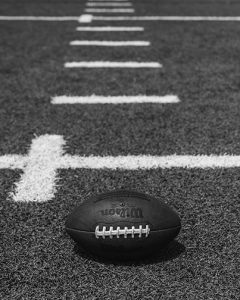 November 22, 1963, along the Hudson River in New York was, as I recall, a beautiful day, full of sunshine and fairly warm weather. My roommate Frank Meszar and I were both Yearlings (sophomores) at West Point. We had just finished our lunch and had gone back to our room to pick up our books for the afternoon classes. Because we had a little time and we were in a great mood—hey, Thanksgiving and the Army-Navy game were just around the corner! —Frank decided he wanted to play his favorite record. This was a recording of a Bob Hope concert that had been made at the American Embassy in Moscow for the staff and employees. Frank definitely had exotic tastes. His second favorite record was a recording of the Red Army Chorus singing patriotic songs. Go figure.
November 22, 1963, along the Hudson River in New York was, as I recall, a beautiful day, full of sunshine and fairly warm weather. My roommate Frank Meszar and I were both Yearlings (sophomores) at West Point. We had just finished our lunch and had gone back to our room to pick up our books for the afternoon classes. Because we had a little time and we were in a great mood—hey, Thanksgiving and the Army-Navy game were just around the corner! —Frank decided he wanted to play his favorite record. This was a recording of a Bob Hope concert that had been made at the American Embassy in Moscow for the staff and employees. Frank definitely had exotic tastes. His second favorite record was a recording of the Red Army Chorus singing patriotic songs. Go figure.
Anyway, we had played this Bob Hope record so many times we both knew the thing by heart. So whenever Hope would come to a punch line we would shout it out and then whoop and stomp and laugh our fool heads off.
Right in the middle of one of our laughing fits, the door suddenly opened and one of our classmates stuck his head in the room and began shouting, “They’ve killed the President! They shot the President!” We both looked at the guy as though he were crazy. What was he saying? The President had been shot?
We noticed several other cadets walking down the stairs and heading out the door into the quadrangle formed by the barracks and decided to follow them outside. Cadets were all milling about in small groups talking quietly, trying to absorb what they had just heard. It was an incredible moment. Some were crying openly; I hadn’t seen that sort of emotion since the previous year when the President had addressed the nation about the Cuban missile crisis while we were eating dinner.
The only adjective that would describe the scene in the quadrangle was “stunned.” I can’t remember if we just stayed there and milled about or if we dispersed and went to class. But I do remember the stunned silence of the hundreds of cadets.
The other thing I remember about that time was that, as I mentioned, the annual Army-Navy football game was only a few days away. Because of the mood of the nation at large, there were serious discussions about canceling the game. Thanksgiving had already been ruined for most Americans, and for us cadets, canceling the game was yet another blow. Finally, the Kennedy family prevailed on the powers-that-be and the game was rescheduled to be played a week later than originally planned.
The mood in Philadelphia was somber as I recall. Both academies marched on to the field, and the assembled crowd seemed much more subdued than usual. But once the game began, the old rivalry seemed to renew itself with its usual vigor. And what a game it was.
It was a nail-biter all the way, and finally, with about 10 seconds left on the clock, Army had the ball inside Navy’s 10-yard line with a chance to score a touchdown that would tie the game up. For some reason, though, the team stepped over to the sideline—perhaps a time out had been called? —and when they returned to the field the referees signaled that the clock had run out and the game was over. The players, the coaches, and the assembled fans were stunned. What had just happened? Pandemonium resulted. But after several minutes, we all knew the game was over and Navy had won. (JFK, a former Navy man, would have been pleased.)
As is the tradition, after the game is over, each academy stands and sings its alma mater before leaving their seats. And so, the Corps rose to its feet to carry on the tradition. But one first classman (a senior) from my company, sitting a few rows behind me, refused to get up. He just sat there, head in his hands, moaning, “It’s not over. It’s not over. It’s not over. They have to reset the clock. We have to be allowed to finish.”
As I stood watching him, broken hearted and miserable, I couldn’t help thinking that his words were meant for all of us who had endured those two awful weeks. I thought about John Kennedy, and this Firstie’s words echoed in my mind: “It’s not over. It’s not over. It’s not over. They have to reset the clock. We have to be allowed to finish.”
Back to the Table of Contents